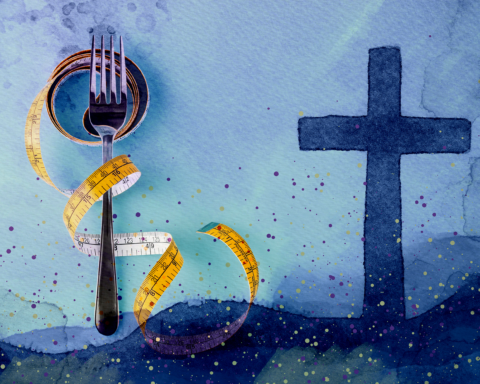Matthew 4:1-11
Prove it.
If you are who you say you are, prove it.
I have always loved Lent. I was a child who took everything far too seriously; there are more pictures of young Slats staring intently at something than pictures of me laughing or smiling. My mother called me her “serious one”, and while I reveled in the joys of Christmas and Easter, as soon as I started to understand what Lent was, I loved it. I loved it for its intensity. I loved it for its gravity. I loved it for the opportunity to prove myself. The spiritual disciplines of Lent allowed me to prove to myself and others that I was worthy of calling myself a Christian. It was my way of earning God’s love.
And as an intense child, I was equally intense with my Lenten disciplines. I started as many of us do, by giving up things like chocolate and soda. I beamed with pride as I lasted the full 40+ days (including the Sundays) giving up the things I loved as a show of piety. One year, my pastor offered us a list of possible disciplines that went beyond “giving up something for Lent”, and I quickly homed in on the one I thought was the hardest: fasting from sundown on Good Friday to sunrise on Easter Sunday. “I’m going to be so good at this,” I thought. But I was in middle school and didn’t know too much about healthy fasting and I didn’t drink any water. I spent that Easter Sunday morning at home, away from church, throwing up whatever I tried to eat, nursing myself back to health.
But at least I’d proven it, right?
At least I’d proven I deserved to be here.
If you are who you say you are…
If I am honest, I subscribe to the common-but-often-unspoken theology: “God loves everyone except me.”
“God’s mercy is poured out for everyone except me.”
“God’s love is unconditional for everyone in the world, except for me, who has to earn it.”
It’s much easier to tell others that God loves them, that they are created in the image of God, that they are beloved, than it is to believe it for yourself. For as long as I can remember, I have believed that any value I have is only the value that I have earned. If a partner told me they loved me, my honest question was, “Why?” Because of course, I never believed I was doing enough. I could be at church three times a week, singing in the choir, attending every worship service, volunteering my time, and it wouldn’t be enough. I could make strides in my career and win awards at school and it wouldn’t be enough. It would never be enough for me, I thought. For my loved ones, I feared. For God, I believed.
“I’m bisexual.”
“How do you know?”
My doubt of my own worth was not entirely about my queerness. I’m sure if I was straight and cisgender I would have these thoughts, too, but my queerness running into my religion exacerbated it.
I was very lucky in my upbringing as a queer person in the church. I grew up in a congregation where I knew not everyone was on board with fully accepting me, but they cared about me and were open enough to let that care and love take precedent over judgement. But even a positive church environment didn’t stop me from picking up the messages that told me I didn’t belong in a church. But I loved the church. I didn’t want to leave the church. So I set out to prove that I did belong. By the time I was in fifth grade, I had memorized more verses of Leviticus than most Christians will read in their lifetimes. I’d started looking up words in Greek. I learned about ancient Jewish and Roman customs, all to prove that I did belong. I read studies about “the causes of homosexuality” to prove that I was part of God’s creation, too. When I came out as non-binary much later, I had to have information about the ambiguity of biological sex, the historical validity of the singular “they”, and gender identity throughout history and cultures, all waiting in my back pocket for when someone said “that’s not real” and asked me to prove it.
Then Jesus was led up by the Spirit into the wilderness to be tempted by the devil.
One of the assumptions I held onto from my childhood about this scripture was that Jesus was going into the wilderness to prove himself. To prove that he was ready to start this ministry. After he passed the test, it would be clear he was ready to begin the work he was born among us to do. This was an example to all of us, I thought, to prove our validity as Christians.
But it is not God who asks for proof. It is the devil.
It is not God who asks Jesus to prove who he is. It is not God who asks Jesus to show who he is in a way that would be clear and obvious and understandable to anyone witnessing. It is not God who tests Jesus’ fortitude in the face of temptation. It is the devil.
God doesn’t need proof. God knows. Every inch of our identities, every misguided belief of not being enough, God knows already. Right before this season in the wilderness, Jesus has been baptized and claimed as beloved (just as God claims all of us as beloved—even me, apparently). God didn’t need proof to do that.
“How do you know?”
“Well, how do you know you’re straight?”
So here we are at the beginning of the season of Lent. Here we are in the days when we determine what these 40 days should hold for us, how they can be a meaningful time of preparation and remembrance.
Here is what I am trying to give up:
I am trying to give up the idea that my worth is bound to my productivity.
I am trying to give up the burden of proving my belovedness does not come with a caveat.
I am trying to give up the comfort of all the ways I prove to the world and the church that I belong, and instead, sit in the wilderness of what I too-often struggle to believe: that I am known, that I am loved, that I am saved by none of my own action but by the unconditional love of the God who created me in Their image. It feels empty and vulnerable to not be surrounded by the walls I’ve built through my accomplishments and commitments and relationships.
But I believe it might indeed be holy work.
As you move through this week, take some time to write out those things that you would never let your friends say to themselves, but you say to yourself all the time — the negative thoughts that creep in when you’re stressed, the frustration when something doesn’t go as planned. Then, practice crafting the opposites of those sentences that show grace which is how God treats you. Consider treating yourself that way, as well.
Slats Toole (they, them, theirs) is a writer, musician, preacher and theater professional currently based in New Jersey. Slats’ Lenten poetry series has been compiled in the collection Queering Lent, and their work has also been published in places like Call to Worship, The Presbyterian Outlook and Sacramental Life. Slats has led workshops on expansive language and queer theology (with a particular emphasis on gender identity) throughout the United States and Canada. They serve on the Advisory Team for NEXT Church, and are the resident sound designer for the In[heir]itance Project.






Unbound Social